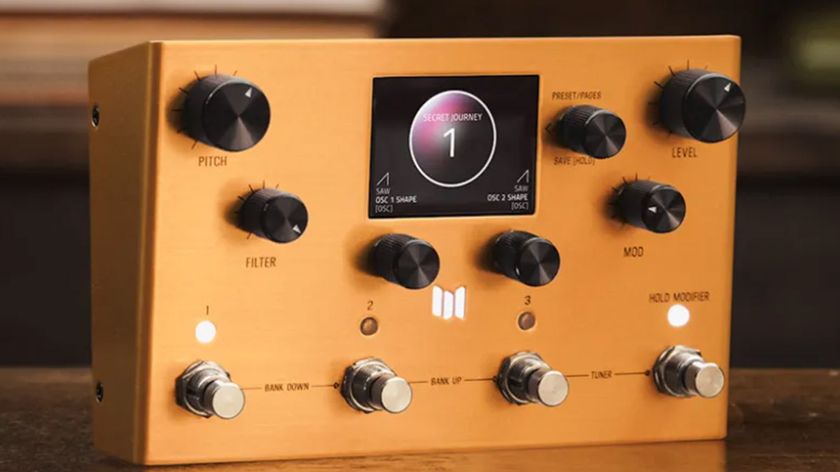“There’s something about the sound of those old strings on that old guitar, it’s special”: Wait, what!? Feeder’s Grant Nicholas has not changed the strings on his Jazzmaster for eight years
How fresh do you like your strings? On his '59 Jazzmaster, Grant Nicholas likes 'em deader than dead for that “real woody organic sound,” and it is his secret weapon in the studio

Representatives of D’Addario, Ernie Ball, Elixir and any other electric guitar string brands, please look away now. What you are about to read might shock you. Grant Nicholas, the frontman/guitarist for British alt-rock stalwarts Feeder, has admitted that he has not changed the strings on one of his go-to guitars for eight long years.
Speaking to Total Guitar, about the release of Feeder’s new double album, Black/Red, he said that it had been eight years since he changed the strings on his ’59 Jazzmaster, and it is one of the most important guitars he has for recording.
This revelation defies orthodoxy. Sure, many of us – perhaps most? – find new strings a little shiny sounding as soon as we string ‘em up, but regularly changing our strings, that’s just what we do. It’s like washing our underwear, brushing our teeth... Okay, those things you should definitely do more often but you get the idea.
But Nicholas applies the logic of the oenophile, believing that, like wine, strings on this particular Jazzmaster only get better with age – the tannins softening, the overtones mellowing out, etc.
This tells us a few things about Nicholas. One, he does not play inordinately hard; he has not broken a string in that time. Two, he knows exactly what sound he is looking for. But eight years? That's a long time.

“I haven’t changed the strings on that guitar in eight years!” he says. “They’re completely dead, but I just love the sound of it. If I need something with a bit more life, I’ll use a different one with newer strings, but there’s something about the sound of those old strings on that old guitar, it’s special.”
There is method to Nicholas’ madness. What he is doing is not that different to those indie-folk players who have retrofitted their guitars with rubber bridges. It is similarly a way of tailoring the sound to his liking, and less invasive, too.
Get the MusicRadar Newsletter
Want all the hottest music and gear news, reviews, deals, features and more, direct to your inbox? Sign up here.
And assuming the strings are cleaned after playing, the feel of them might not be that weird. We have all experienced the feel of those abandoned electric guitars you find in the school’s music department – or in the office – and it isn’t pretty.
This is not a new tactic from Nicholas. He has been doing this for some time now, playing the long game with strings. Speaking to MusicRadar in 2016, Nicholas said that he hadn’t changed his strings since tracking Feeder’s 2012 studio album, Generation Freakshow.
“It gives it that real woody organic sound that I love,” he explained. “Even for clean. I’m not really into that super bright sound. So you don’t need new strings on for recording, and I hate the sound of acoustics with new strings. Especially for fingerpicking. Having said that, if you want a real rocking sound with a bit of edge to it, yes. But rather than change the strings on my ’59 I’d just use another Jazzmaster if I wanted that.”
Nicholas is in good company. Feeder bassist Taka Hirose has a similar approach. But then bass guitar is a different kettle of fish. You can boil yer old tone noodles and reuse them if you're so inclined – it's a money saving tactic for the parsimonious player.
For a full rundown of the gear Nicholas used to track Black/Red, check out MusicRadar’s interview with Nicholas from May. And if it has been a minute since you changed your strings and you've lost the knack. Fear not, this handy step-by-step guide will show you how to restring your electric guitar.
Black/Red is out now via Big Teeth Music. You can read Grant Nicholas's interview with Total Guitar in the May issue, available now from Magazines Direct. Slash is on the cover.
Jonathan Horsley has been writing about guitars and guitar culture since 2005, playing them since 1990, and regularly contributes to MusicRadar, Total Guitar and Guitar World. He uses Jazz III nylon picks, 10s during the week, 9s at the weekend, and shamefully still struggles with rhythm figure one of Van Halen’s Panama.

“You would get suspended for even having a guitar”: Brian May says it was “illegal” to have a guitar at his school – but he and his friends played during lunch hour anyway

“Gibson was able to put the universe on it… the planet Mercury is here, and that is a little nod to a friend of mine”: Inspired by the stars and co-designed by the Queen guitarist, Gibson unveils exquisite Brian May SJ-200 12-String
Most Popular











